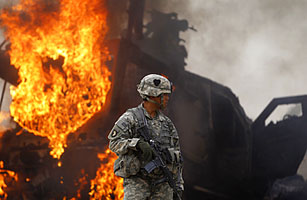The Obama White House is furious this morning about the massive leak of military documents chronicling the unvarnished truth about the Afghanistan war. At the same time, though, there must be a certain sense of relief around the West Wing. When they first learned that the whistleblower website WikiLeaks had given the New York Times, among others, an astonishing 92,0000 documents, senior Obama officials must have been in a panic about what terrible secrets might emerge. But it turns out that most of the terrible aspects of the Afghanistan war–at least those detailed by this trove of insider accounts–are already pretty well known.
It’s never been a secret, for instance, that the Taliban have proven more resilient than anyone expected; that U.S. special forces hunt and eliminate Taliban leaders without the courtesy of a fair trail; that elements within our putative ally Pakistan play a sinister double game with radical Islamists; that our troops kill innocent Afghans on a regular basis. It’s not even a secret, as anyone familiar with the Pat Tillman saga knows, that the military sometimes manipulates facts about the war.
The trove of leaked documents affirms all these facts. And in their texture and detail–which it will take some time for other new outlets to sift in full–certainly offer a new appreciation for how difficult the war effort is. But based on their presentation by the news organizations given time by Wikileaks to study them before their release, the documents don’t seem to reveal fundamental new truths. (Also giving solace to the Obama team: the docs cover a time period from January 2004 to December 2009, meaning that the vast majority predate Obama’s tenure, and end just around the time of the address he gave last winter at the conclusion of his Afghanistan policy review.)
Take, for instance, perhaps the most explosive charge, and the one which led the Times website in a headline late Sunday night: Pakistan Aids Insurgency in Afghanistan, Reports Assert. Here’s the story’s opening paragraph:
Americans fighting the war in Afghanistan have long harbored strong suspicions that Pakistan’s military spy service has guided the Afghan insurgency with a hidden hand, even as Pakistan receives more than $1 billion a year from Washington for its help combating the militants, according to a trove of secret military field reports made public Sunday.
This shouldn’t come as a surprise to anyone who even skims the front pages of major newspapers. Consider, for instance, this story which appeared on page A1 of the NYT on March 26 of last year:
Afghan Strikes by Taliban Get Pakistan Help, U.S. Aides Say
The Taliban’s widening campaign in southern Afghanistan is made possible in part by direct support from operatives in Pakistan’s military intelligence agency, despite Pakistani government promises to sever ties to militant groups fighting in Afghanistan, according to American government officials.
This isn’t to say that the documents are irrelevant. Sometimes it can be crystallizing to see hard truths articulated not by reporters covering a war but in the real-time reports of the men and women on the ground. Moreover, the media frenzy about the documents–we’re already seeing comparisons to the Vietnam-era Pentagon Papers–is bound to startle the public and put a further dent in support for the war.
And that’s not nothing. In recent months we’ve seen a steady drumbeat of bad headlines from Afghanistan, from the mixed success of the ballyhooed Marjah offensive to the spectacular flame out of General Stanley McChrystal. The Wikileak dump is certain to accelerate the feeling, both around the country and here in Washington, that the war effort isn’t sustainable for much longer. And right now, the biggest secret of all, the one no one is leaking, is whether Barack Obama agrees.


